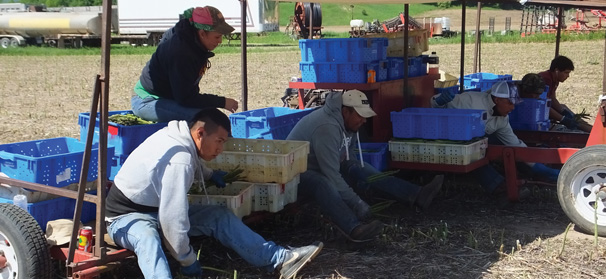

Feb 19, 2015H-2A project expanding to include vegetable growers
For Michigan’s fruit and vegetable growers, use of the federal H-2A program – which allows agricultural employers to hire foreign workers on a temporary basis – was almost nonexistent before last year, when four apple growers hired guest workers as part of a pilot project.
The pilot was successful enough that its chief organizer, Michigan Farm Bureau (MFB), is planning to expand use of H-2A in the state this year, with the hopes of including four asparagus growers and four summer vegetable growers, said Bob Boehm, manager of MFB’s Center for Commodity, Farm and Industry Relations.
MFB started experimenting with H-2A because Michigan’s traditional pool of farm workers is dwindling, and finding alternative ways to attract seasonal labor has become a necessity.
As part of its efforts, MFB is forming a limited liability company and hiring a labor coordinator. It’s also working with industry representatives to find growers who would be a good match for H-2A workers, Boehm said.
For the time being, MFB will assist growers with individual H-2A contracts, as opposed to hiring employees to work on multiple farms. Such a cooperative approach would save on costs like transportation, but it will take time to build up that level of trust and coordination between growers, he said.
“We need to gain experience in the program by recruiting workers for more specific harvesting jobs before taking on the additional risk of recruiting workers” for general farm labor. The costs involved are significant, and growers want to make sure they are getting workers with the specific skills they need, Boehm said.
“There are differences between the skills and requirements in a job description for harvesting asparagus compared to apples or blueberries or Christmas trees,” he said.
The Michigan Asparagus Advisory Board is working with MFB on the H-2A project, to see if the program is a good fit for the asparagus industry. Participating asparagus growers will need workers to arrive for harvest around May 1, said John Bakker, the board’s executive director.
An H-2A panel will be held March 12, during Oceana Asparagus Day in New Era, Michigan. More information about the program will be available during that conference, Bakker said.
Apple pilot
Between them, the four orchards that participated in the pilot project last fall – all located in west-central Michigan – hired 90 apple pickers. Despite the added cost and paperwork that comes with using H-2A, most of them plan to participate again this year, said Sarah Pion, the MFB representative who worked with the growers.
Overall, the growers’ experience was positive. Their labor supply was more consistent, and the work ethic of the guest workers encouraged domestic workers to improve their performance, which lead to higher production and improved quality, Pion said.
One of the participants was Joe Rasch Orchards. According to harvest farm manager Katie Rasch, the orchard will participate in the H-2A program in 2015, even though it had to jump some high hurdles in its first season.
The amount of documentation needed was much greater than in the past, for example, and the costs were much higher. The orchard had to buy a lot of supplies for the guest workers. H-2A rules required it to pay the travel costs of domestic workers who came from more than 60 miles away, and to pay a higher minimum wage ($11.49 an hour) to both guest and domestic workers. That was a big financial hit, but the payoff was higher quality, Rasch said.
Other benefits included knowing that a guaranteed percentage of the work force was going to show up on the same day, instead of dribbling in. The workers were reliable and respectful, as well. And for the first time, the orchard had a detailed labor contract and structured training program, she said.














